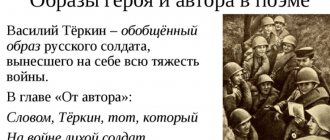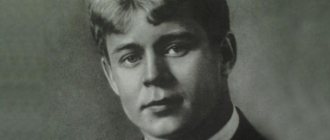Characteristics of the main characters in “The Tale of Igor’s Campaign” with quotes
Check out these essays
- Characteristics of the main characters in “The Tale of Igor’s Campaign” with quotes “The Tale of Igor’s Campaign” is one of the most ancient works of not only Russian, but also world literature. At the same time, it has a mysterious and interesting history: written about 800 years ago, the “Word” was forgotten and was found completely by accident in the 18th century. Many scientists are studying this greatest of masterpieces, but have not yet been able to fully unravel it. It is obvious that the work is deeply patriotic and carries an appeal to all future generations, a call to preserve the integrity of the homeland, […]
- Characteristics of Prince Svyatoslav in “The Tale of Igor’s Campaign” “The Tale of Igor’s Campaign” is an amazingly wise and beautiful work, a talented and patriotic description of extremely important historical events for Russia. It is probably impossible to comprehend the full depth of the “Word”. Rereading it again and again, each time we discover something new, previously unnoticed wisdom or a subtle hint of a hidden thought in poetry. High spirituality, the deepest understanding of the psychology of the people and their life, the filigree skill of the author put “The Tale of Igor’s Host” on a par with the greatest […]
- Characteristics of Prince Igor in “The Tale of Igor’s Campaign” with quotes “The Tale of Igor’s Campaign,” created more than eight centuries ago, is the most significant monument of ancient Russian culture. They study him, admire him and try to understand him. We may never be able to comprehend the full depth and wisdom of this masterpiece. Researchers of “The Tale of Igor’s Campaign” came to the conclusion that this work tells not about an individual person, but about the entire Russian land of that time. The image of Prince Igor is collective and symbolizes all the princes of Ancient Rus'. On the one hand, the author sees in his hero […]
- Artistic features of “The Tale of Igor’s Campaign” Created eight centuries ago by the genius of the Russian people, “The Tale” retains the significance of an unfading example for the present, for the future - both with its powerful patriotic sound, and the inexhaustible richness of content, and the unique poetry of all its elements. A dynamic style is very characteristic of Ancient Rus'. He finds himself in architecture, painting and literature. This is a style within which everything that is most significant and beautiful appears majestic. Chroniclers, authors of lives, church words […]
- Prince Igor in “The Tale of Igor’s Campaign” The author of “The Tale of Igor’s Campaign” wrote his work in 1185. At this time, Great Rus' and Kyiv were in a difficult situation. The huge state created by Grand Duke Oleg, which flourished during the reign of Vladimir Svyatoslavich and Yaroslav the Wise, after his death began to be divided into many principalities and fell into decay. Kyiv preserved the ancient traditions of its valor; it was famous for its historical legends, the graves of famous princes, starting with Oleg. The Kiev prince still bore the title […]
- Russian land in “The Tale of Igor’s Campaign” “The Tale of Igor’s Campaign” was written in the 12th century. This work is dedicated to Prince Igor’s unsuccessful campaign against the Polovtsians, his capture and return to his homeland. “The Tale of Igor’s Campaign” is imbued with true patriotism, sincere love for one’s fatherland. That is why the image of the Russian land occupies a significant place in the work. The entire work is imbued with love for the Motherland. The description of the landscape of empty arable land emanates deep humanity. Sad pictures of an abandoned field, where instead of a plowman there are only […]
- An essay-discussion on the topic “The Tale of Igor’s Campaign” “The Tale of Igor’s Campaign” is considered to be a monument of ancient Russian literature. It is not without reason that the work received such a high title, because the role of this epic poem is not only to describe historical events, but also to reflect Russian culture. The narrative touches on the events of the end of the 12th century, namely the campaign of the Novgorod-Seversk prince Igor Svyatoslavich against the Polovtsians. And this historical heritage is characterized by one distinctive feature: despite the fact that the epic, as a rule, glorifies the exploits […]
- An essay-reasoning on the topic: “Learning is light, and ignorance is darkness.” Since childhood, we have been going to school and studying different subjects. Some believe that this is an unnecessary matter and only takes away free time that can be spent on computer games and something else. I think differently. There is a Russian proverb: “Learning is light, but ignorance is darkness.” This means that for those who learn a lot of new things and strive for this, a bright road to the future opens up ahead. And those who are lazy and do not study at school will remain all their lives in the darkness of stupidity and ignorance. People who strive for [...]
- Satire in the works of Saltykov-Shchedrin The name of Saltykov-Shchedrin is on a par with such world-famous satirists as Mark Twain, Francois Rabelais, Jonathan Swift and Aesop. Satire has always been considered an “ungrateful” genre - the state regime has never accepted caustic criticism from writers. They tried to protect the people from the creativity of such figures in a variety of ways: they banned books from publication, exiled writers. But it was all in vain. These people were known, their works were read and respected for their courage. Mikhail Evgrafovich was no exception […]
- The generation of “fathers” in Turgenev’s novel “Fathers and Sons” Regarding the ideological content of the novel “Fathers and Sons,” Turgenev wrote: “My whole story is directed against the nobility as an advanced class. Look at the faces of Nikolai Petrovich, Pavel Petrovich, Arkady. Sweetness and dullness or limitation. An aesthetic feeling forced me to take the good representatives of the nobility in order to prove my theme all the more accurately: if cream is bad, what about milk?.. They are the best of the nobles - and that is why I chose them to prove their inconsistency.” Pavel Petrovich Kirsanov […]
- Lessons of kindness (based on the story “The Horse with a Pink Mane”, Astafiev) Victor Astafiev’s story “The Horse with a Pink Mane” immerses the reader in the light and exciting world of childhood. The plot of the story is realistic from beginning to end, but the reader is left with the feeling of a fairy tale, the magic of what is happening. From the first to the last word the story is full of love and kindness. The author conveys to the reader the idea that the most important lessons in life are precisely those lessons of kindness. The narration is told in the first person. The main character, a little boy, dreams of a pink gingerbread horse. This horse is [...]
- The Gorky playwright's innovation in the play “At the Lower Depths” The drama opens with an exposition in which the main characters are already presented, the main themes are formulated, and many problems are posed. Luke's appearance in the rooming house is the beginning of the play. From this point on, different life philosophies and aspirations begin to be tested. Luke’s stories about the “righteous land” are the culmination, and the beginning of the denouement is the murder of Kostylev. The composition of the play is strictly subordinated to its ideological and thematic content. The basis of the plot movement is the testing of philosophy by life practice [...]
- The reason for Raskolnikov's crime Rodion Raskolnikov, the main character of the novel "Crime and Punishment" by F. M. Dostoevsky, commits one of the most terrible crimes, from the point of view of the Bible and human morality - murder. He is a poor student, a commoner, who decides to kill an old woman, pawnbroker Alena Ivanovna. During the murder, he dooms her harmless sister Lizaveta, who was also pregnant, to death. The writer presents to the reader not just a murderer, but a tragic character, endowed with a lot of positive […]
- Comparative characteristics of the Rostov and Bolkonsky families in the table Character Ilya Rostov Nikolay Rostov Natalya Rostova Nikolay Bolkonsky Andrey Bolkonsky Marya Bolkonskaya Appearance Curly-haired young man of short stature, with a simple, open face Not distinguished by external beauty, has a large mouth, but black eyes Short stature with dry hair outlines of the figure. Quite handsome. She has a weak body, not distinguished by beauty, is thin-faced, and attracts attention with large, sad, radiant eyes. Character: Good-natured, loving [...]
- An essay on the lyrical hero in Blok's poetry Alexander Blok was the largest symbolist poet in Russian literature. His recognition as a lyric poet was universal and undeniable. During his lifetime, Blok prepared for publication a collection of his poems, which he considered as a kind of autobiographical trilogy of “incarnation.” The main character of the trilogy is a lyrical hero-poet. The collection of poems reflects the path of his spiritual maturation, formation, and quest. The very idea of creating a lyrical “autobiography of the soul” is unique. The author speaks not about facts, but about feelings, [...]
- Zhukovsky’s poem “Song” (analysis) Zhukovsky considered Karamzin, the head of Russian sentimentalism, to be his teacher in poetry. The essence of Zhukovsky’s romanticism was very accurately characterized by Belinsky, who said that he became a “heartfelt singer of the morning.” By nature, Zhukovsky was not a fighter; his “complaints” never developed into open protest. He moved away from the present into the past, idealized it, thought about it with sadness: O dear guest, sacred before, Why are you crowding into my chest? Can I say: live in hope? Let me tell you what happened: [...]
- “Anna Snegina” by Yesenin (analysis) Sergei Yesenin’s soulful lyrics leave no one indifferent. The poem “Anna Snegina” is one of the peaks in the poet’s work. The subtle, simple and gentle soul of Yesenin emerges in it, who made himself the main character and the poem autobiographical. The poem was written in 1925 in Batumi, shortly before the poet's death. Just as Bunin, before his death, recalled his youth and love in the “Dark Alleys” cycle, so Yesenin recalls with bright sadness his past love and a new meeting with Anna. Both writers created their […]
- Bazarov’s death is the result of his life’s journey Roman I.S. Turgenev's "Fathers and Sons" ends with the death of the main character. Why? Turgenev felt something new, saw new people, but could not imagine how they would act. Bazarov dies very young, without having time to begin any activity. With his death, he seems to atone for the one-sidedness of his views, which the author does not accept. Dying, the main character did not change either his sarcasm or his directness, but became softer, kinder, and speaks differently, even romantically, that […]
- The life-affirming principle in Fet's lyrics about nature Others have inherited from nature a prophetically blind instinct: They smell and hear waters And in the dark depths of the earth. Beloved by the great mother, Your destiny is enviable a hundredfold: More than once, under the visible shell, You have seen it. F.I. Tyutchev Afanasy Afanasyevich Fet was sincerely convinced that you need to create only by following your inspiration and emotional impulse. He denied the leading role of reason in the cause of the “liberal arts.” The subject of art, in his opinion, can be, first of all, nature, love, beauty, and here the main […]
- The Battle of Austerlitz in the novel “War and Peace” (essay) One of the psychological aspects of L.N. Tolstoy’s novel “War and Peace” is the writer’s deep attention to the feelings and thoughts of the characters. The life process becomes the main theme of the description of the battle at Austerlitz. Here he shows the personality of a person in such a way that the unique and only impulses of the soul appear, which are the most precious and truest in each of us. And the most amazing thing is that it is from these multifaceted details, from the characteristic details that the real picture of what happened is created. Life and […]
Woman crying
Yaroslavna turns to the forces of nature, she cries and asks for help. Obediently and humbly stands in the wind, looking like a bird wanting to fly. The bird's wings have been clipped (it was deprived of the most valuable thing in life). She imagines flying, but cannot take off. The woman’s grief is described by the author in everything: in appearance, in pose, in words. Crying is a declaration of love and fidelity to your husband, the father of the children. It is also surprising how brilliantly the author conveys the Russian woman’s respect for the forces of nature. She sincerely believes that her word will be heard. In the cry of one Yaroslavna, the tears of widows and the grief of mothers merged. Yaroslavna became the prototype for many female characters in Russian literature. Open, sincere, romantic, they will resemble a princess, although whole centuries will pass between them. The strong nature of a devoted Russian woman is the main character of the historical story.
Who was Yaroslavna really?
Almost nothing is known about the girl’s age and name. Historians suggest that she was married to Prince Igor at about the age of eighteen, and the girl’s name could have been Euphrosyne. However, there is no evidence of this. Yaroslavna is a woman who belongs to the highest class. After all, her husband is a feudal lord. However, the girl is familiar with the sorrows and worries of the most ordinary woman. She is in painful anticipation of her beloved from the battlefield, grieving and crying.


